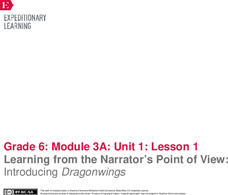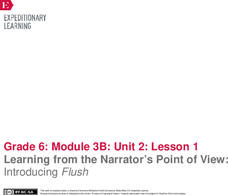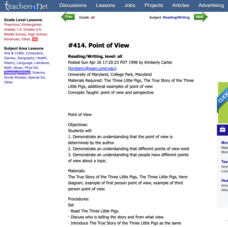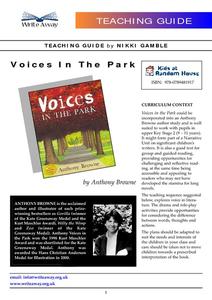Curated OER
Hawthorne: Author and Narrator
High schoolers examine the difference between a narrator and author. They read Nathaniel Hawthorne's novel, 'The Scarlet Letter,' write a description of the narrator, and research how Hawthorne was impacted by the politics of the time.
Curated OER
Author's Day
Have your learners choose an author to study. One resource link gives a list of approved authors. Scholars read at least three works produced by that author and produce three separate book reports as well as a two-page author report....
EngageNY
Learning from the Narrator’s Point of View: Introducing Dragonwings
Journey into the past with Laurence Yep's Dragonwings. Scholars complete anchor charts to analyze techniques the author uses to develop the narrator's point of view in his novel. As they read, pupils also complete word catchers to track...
EngageNY
Learning from the Narrator’s Point of View: Introducing Flush
It is all down the drain. Scholars read chapter one of Flush and write any unfamiliar words in their word catchers and identify the narrator and point of view of the story. Pupils complete a point of view anchor chart and use Thought,...
Curated OER
Summer of the Monkeys
While reading the book Summer of the Monkeys by Wilson Rawls, the class ties together the core reading objectives, which are making predictions, comprehending new information, reading for author's purpose, independence in reading, and...
Curated OER
Frankenstein
Share a classic novel with your class using this resource. After reading Frankenstein by Mary Shelley, learners answer questions involving the narrator's point of view, make and confirm predictions, and sequence events in the story.
Curated OER
Hawthorne: Author and Narrator
High schoolers read various pieces of literature by Nathaniel Hawthorne to recognize the difference between a narrator and author. Students in small groups report on the narrative point of view represented in a story they have read.
Curated OER
The Call of the Wild
Students read The Call of the Wild, noting its theme of survival. They investigate the book's concepts with word webs, spider maps, or graphic organizers. They conduct a panel discussion on dogs and wolves. They write a letter to the...
Curated OER
Historical Agency in History Book Sets (HBS)
Study historical events by combining the study of historical fiction and non-fiction. Learners read about true past events in historical fiction novels and then research non-fiction accounts of the same events. What are some differences...
National Endowment for the Humanities
Literary Genres in “Moby-Dick”
Moby Dick is more than a whale of a tale narrated by Ishmael. A lesson studying Herman Melville's classic novel asks readers to examine the different genres the author weaves into his story. Instructors model how to conduct a stylistic...
Teachers.net
Point of View
Work with your class on point of view by reading "The Three Little Pigs." Learners demonstrate an understanding that the point of view is determined by the author and that different points of view exist. They then read a different short...
Curated OER
Finding Problems In A Story
Students categorize information into a problem/solving chart and examine the value of using a diary. In this problem solving and diary instructional activity, students read portions of Dear Mr. Henshaw, while they investigate the...
Curated OER
Bambara's The Lesson
Twelfth graders read the short story The Lesson. They research the socio-economic and cultural context of the story and author. They examine the author's point of view. They analyze the first person narration in the story. They rewrite...
Write Away!
Voices In the Park
Explore the impact a narrator's point of view has on a story with a reading of the children's book, Voices in the Park by Anthony Browne. Written in four different voices, the story is told and retold from different perspectives to...
Curated OER
The Individual and His Role in Society
Tenth graders discover how various writers approach the themes of : alienation and solitude, living life "deliberately" and "phonies." Through reading, journaling, class discussion, and writing assignments they realize the power of the...
Curated OER
The First Part Last: Part One
In this The First Part Last comprehension check worksheet, pupils respond to 25 short answer questions pertaining to part 1 of the Angela Johnson novel to better understand the novel and the author's craft.
Curated OER
Diary of a Part-Time Indian pp1-14
In this Diary of a Part-Time Indian comprehension check worksheet, students respond to 18 short answer questions pertaining to pages 1-14 of Diary of a Part-Time Indian in order to help them better understand the novel and the author's...
Curated OER
Poet Analysis: Ciaran Carson
Students analyze lyrics and narration by reading poetry. In this language arts lesson, students read and examine the poem Belfast Confetti. Students discuss the topics and questions asked by the author Ciaran Carson.
Curated OER
Style and Voice
Develop the writing skills of your high school class. Writers consider their personal style and voice, read selections by other authors, and then write pieces that challenge them to experiment with their own style.
Novelinks
The Little Prince: Concept/Vocab Analysis
Focus on the literary elements of Antoine de Saint-Exupéry's The Little Prince with a concept analysis sheet. With suggestions and explanations for many of the book's concepts, vocabulary, and other issues that may arise in instruction,...
Curated OER
The House on Mango Street
Students read The House on Mango Street and analyze why the author chose to tell this story and how the characters are affected by immigration, poverty, and discrimination. Students compare this story to others about immigration to...
Poetry4kids
Personification Poetry Lesson Plan
Scholars take part in two exercises to boost their knowledge of personification. After reading a detailed description and excerpts from famous poems, writers list action verbs and objects then combine words to create a humorous...
Curated OER
Satire and The Adventures of Huckleberry Finn
Does Mark Twain’s satire become sarcasm and does he cross the line of propriety in The Adventures of Huckleberry Finn? As an introduction of satire, class members view an excerpt from The Daily Show and discuss Stewart's use of this...
Curated OER
Rumpelstiltskin, Private Eye
Pupils prepare a classroom theater presentation of Rumpelstitskin in which the narrator is a private eye. They write the defense of one of the characters who conspired against the king and play a vocabulary game.

























